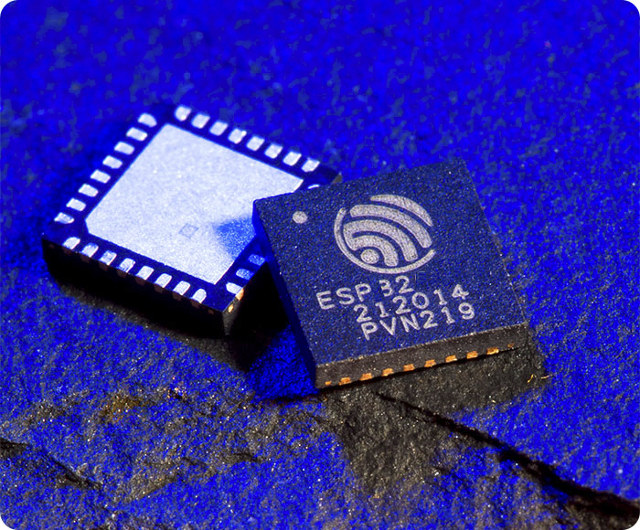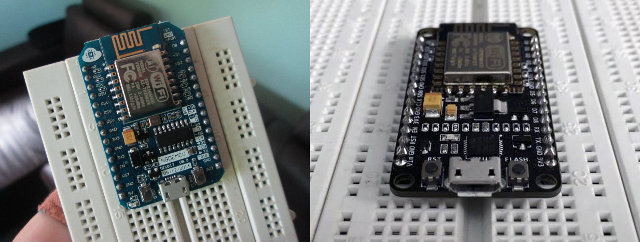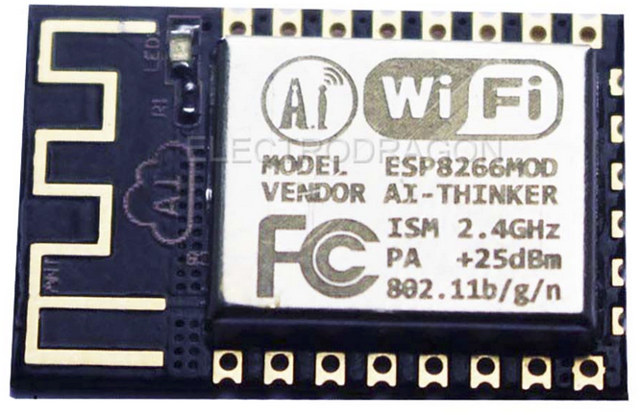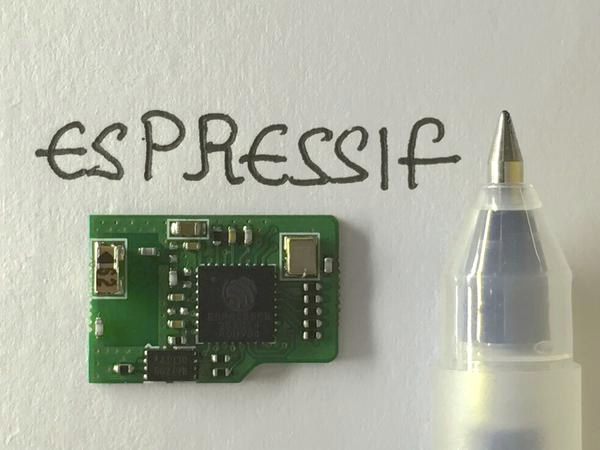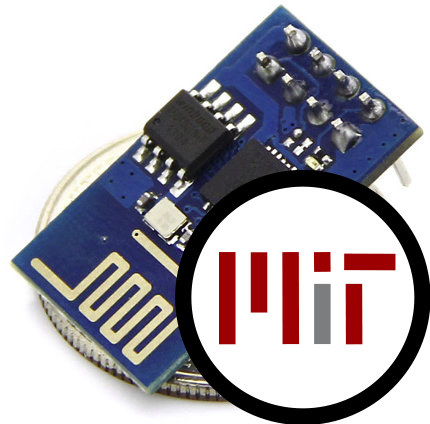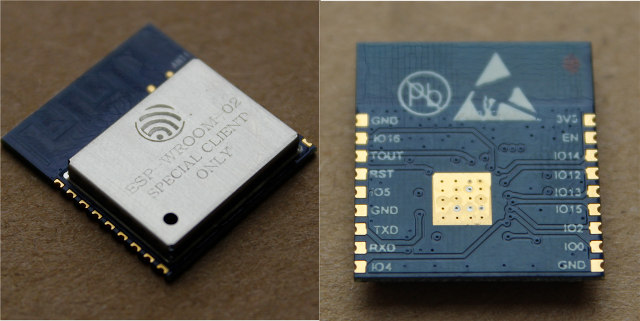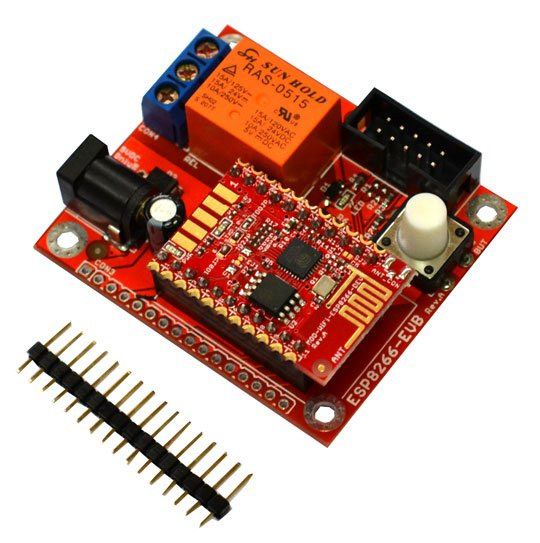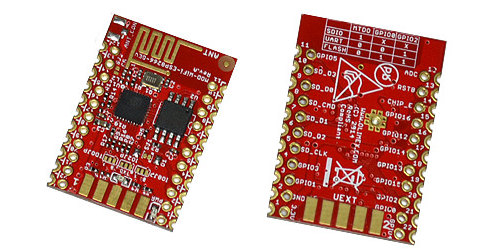Espressif teased us about a successor to ESP8266 a few months ago that would support both WiFi and Bluetooth Low Energy, and John Lee, working for Espressif Systems, has now sent a letter to ESP8266 developers announcing the new wireless SoC with two Tensilica L108 cores and called ESP32. Espressif ESP32 key improvements over ESP8266: Faster WiFi – Wifi has been upgraded to support HT40 speed (144.4 Mbps) and has a new RF architecture to simplify the application schematics Bluetooth Low Energy and Classic Dual core processor – 2x Tensilica L108 processors clocked at up to 160 MHz Low Power Mode Improvements – ADC conversions, level thresholds, etc.. can now be performed in deep sleep Peripherals – Capacitive touch, ADCs, DACs, I2C. UART, SPI, SDIO, I2S, RMII, PMW, etc… but no USB. More RAM – ~400 KB on-chip RAM Security – Hardware accelerated AES and SSL, and more undisclosed improvements. […]
Getting Started with NodeMCU Board Powered by ESP8266 WiSoC
Since ESP8266 is now so popular, I’ve recently bought a NodeMCU board to try it. I selected this board because the latest version of the board is breadboard-friendly, integrates a USB to serial chip, and it can be powered by a simple USB to micro USB cable. I also noticed a ESP8266 tutorial with NodeMCU firmware by SwitchDoc Labs the other day (using ESP-12 and Adafruit Huzzah), which I applied to my NodeMCU board, but since I encountered a few issues, I decided to report my findings, and write my own little getting started guide to switch on/off LED and GPIOs using a web interface. NodeMCU v0.9 and NodeMCU v1.0 If you are going to purchase a NodeMCU board it’s important to know there are two official versions: NodeMCU v0.9 with ESP-12 module NodeMCU v1.0 with ESP-12E module The main complain about NodeMCU v0.9 is that while it fits on […]
ESP-14 WiFi Module Combines ESP8266 with STM8S MCU
ESP8266 WiFi modules can be purchased for less than $3, while some STM8S 8-bit MCUs board sell for just above $1. A.I. Thinker decided to combine both by adding an STMicro STM8S003 micro-controller to ESP-12E module and called that ESP-14. ESP-14 specifications: WiSoC – Expressif ESP8266-EX WiSoC MCU – STMicro STM8S003F3P6 8-bit MCU @ 16 MHz with 1KB RAM, 8KB flash, and 128 bytes EEPROM Connectivity – 802.11 b/g/n WiFi I/Os – STM8: 15 GPIOs also supporting I2C, SPI, UART, and up to 5 10-bit ADC ESP8266: E_GPIO0 to select operating mode (running or download) Power Supply – 3.3V Power Consumption – System Standby mode 70 mA; 0.5 μA shutdown @3.3V Dimensions – 24 x 16 mm STM8S controls ESP8266 by AT commands, and all but one of the I/Os are directly connected to STM8S. I can see at least two advantages: 5 ADC inputs are available, and for battery […]
Espressif is Working on a New Wi-Fi and Bluetooth LE Chip with Hardware SSL Support
Espressif came to fame thanks to its low cost ESP8266 WiFi chip which was originally designed for connected lightbulbs, but soon got used in a variety of applications, and ESP8266 modules must now be the most popular solutions to add WiFi to IoT projects, as long as they are not battery powered. The company has recently announced they were working on a new chip, whose name as yet to be decided, that will support both Wi-Fi and Bluetooth Low Energy. Details are sparse, but we do know the chip will come with 500KB RAM, support hardware SSL and possibly ECDH, deliver 500 DMIPS of performance, and consume 5 uA in deep sleep mode. The company asked for beta testers via their twitter account around 2 weeks ago, so I guess it’s a bit too late to apply. John Lee, working for Espressif, also said the new part should become available […]
ESP8266 SDK 1.1.0 is Now Released Under an MIT License
ESP8266 is the now famous dirt-cheap Wi-Fi SoC used for IoT applications. It can be used by hobbyists and companies alike. But for the later, there was a licensing issue as Espressif ESP8266 SDK was initially released under the GPLv3 license. GPL code is great and lots of open source projects are released under the most common open source license. But since proprietary, closed source software has still its place in the market place, some other more permissive licenses such as LGPL are used for library, and Android for example has an Apache License 2.0. So previously, if you developed an application using ESP8266 SDK, you’re code would have to be GPL too, since the license is viral. It would also cause issues if you had released your application under an Apache or MIT license. But now, all is well, as Espressif released ESP8266 SDK 1.10 under an MIT license, […]
Espressif WROOM WiFi ESP8266 Modules are FCC and CE Certified
Espressif, the company behind ESP8266 (EX) Wi-Fi chip for IoT applications, has now opened store on Taobao, where they sell WROOM-02 and WROOM-02 modules based on ESP8266EX with FCC, CE, TELEC, and SRRC certifications. WROOM-01 has some soldered headers that make it easier to use for hobbyists and prototyping, while WROOM-02 is more compact, and should be more suitable to include in your own products. But otherwise, they share about the same specifications: SoC – Espressif Systems ESP8266EX 32-bit RISC processor @ 80 MHz with integrated WiFi Wi-Fi – 802.11 b/g/n with STA/AP/STA+AP operation modes Header – 2x 18-pin headers with SDIO 2.0, GPIOs, SPI, UART, GND and 3.3V pins Dimensions – 11.5mm x 11.5mm Temperature Range – -40C ~ 125C Certifications – FCC, CE, TELEC, and SRRC The company can also provide “hardware reference design, antenna design, and SDK for secondary development”, but you’re likely to find most of […]
Olimex ESP8266-EVB Wi-Fi Evaluation Board Includes a Relay, an UEXT Connector
Olimex announced open source hardware ESP8266 modules last month, and the company has just announced the availability of ESP8266-EVB board with an ESP8266 module, a relay, an UEXT connector for other compatible Olimex modules, and headers for access to GPIOs. ESP8266 evaluation board specifications: MOD-WIFI-ESP8266-DEV Wi-Fi module with soldered connectors Female connectors for MOD-WIFI-ESP8266-DEV 10A/250VAC Relay Expansions 16-pin header (CON3) with access to some GPIOs, ADC, SDIO, RESET, and power signals. UEXT connector to connect modules and sensors from Olimex, or access I2C, UART, SPI, and extra GPIOs Misc – User Button which can also be pressed at boot time to enter bootloader mode for firmware upgrade. Power Supply – 5V/1A recommended; DCDC power converter to 3.3V to supply ESP8266 and UEXT modules with up to 1.5A current Dimensions – 57x50mm (4 mounting holes) You’ll also need 5V power supply, and a USB to serial board (3.3V) in order to […]
Olimex Introduces Open Source Hardware ESP8266 Wi-Fi Modules, Evaluation Board Coming Soon
ESP8266 has become popular as module based on this SoC make it incredibly cheap to add Wi-Fi to all sort of things, the SDK available, and a community has gathered around the solution. Olimex has jumped on the bandwagon, and is now provided two open source hardware ESP8266 modules: MOD-WIFI-ESP8266 which makes it easy to interface to other Olimex boards thanks to its UEXT connector, and MOD-WIFI-ESP8266-DEV with two rows of 0.1″ connectors and an unsoldered UEXT pad, is better suited if you want to integrate it with your own baseboard, or experiment with a breadboard. An evaluation board called MOD-WIFI-ESP8266-EVB will be launched a little later. Both modules share most specifications: SoC – Espressif Systems ESP8266 32-bit RISC processor with 802.11 b/g/n support(32-pin QFN package), Wi-Fi – 802.112 b/g/n with WEP, TKIP, AES, and WAPI engines, Wi-Fi direct (P2P), and soft-AP. On-board antenna and u.FL connector Expansion MOD-WIFI-ESP8266 – […]


